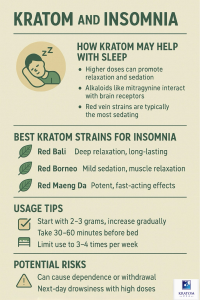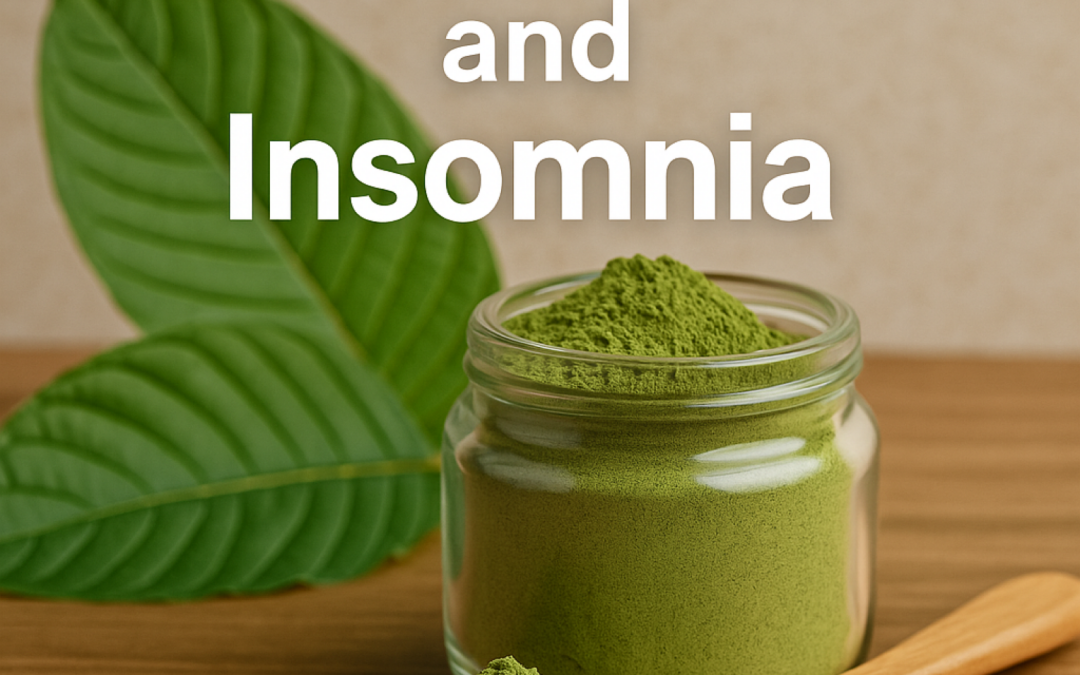🌙 Kratom and Insomnia: Can This Natural Herb Help You Sleep Better?
If you’ve been tossing and turning at night, you’re not alone. Insomnia affects over 30% of adults in the U.S. at some point in their lives, often leading to fatigue, irritability, and poor mental clarity. While pharmaceutical sleep aids are available, many people are now looking toward natural alternatives—and one plant that’s gaining attention is kratom. Kratom (Mitragyna speciosa), a tropical tree native to Southeast Asia, has long been used for its calming, sedative-like effects—especially at higher doses. But can it really help with sleep problems like insomnia? Let’s take a deep dive into kratom and insomnia, how kratom works in the body, and whether it might be a safe, effective option for improving your sleep quality.
📌 Key Points: Kratom and Insomnia
-
🌿 Kratom is a natural herb with sedative properties at moderate to high doses
-
😴 Certain strains—especially red vein—can promote relaxation and deeper sleep
-
🧪 Research and user surveys show kratom may help people fall asleep faster and stay asleep longer
-
⚠️ It’s not without risks—overuse can lead to dependence or tolerance
-
✅ Choosing the right strain, dose, and timing is essential for safe and effective use
🌱 What Is Kratom and How Does It Work?
Kratom is made from the dried leaves of the Mitragyna speciosa tree. These leaves contain over 40 alkaloids, but two in particular—mitragynine and 7-hydroxymitragynine—play a major role in how kratom affects the brain and body.
These alkaloids interact with:
-
Mu-opioid receptors – leading to pain relief and relaxation
-
Dopamine and serotonin pathways – improving mood and calm
-
Adrenergic receptors – regulating alertness and stress response
📖 A 2017 study in Drug and Alcohol Dependence suggested kratom’s primary alkaloid, mitragynine, may have a dose-dependent sedative effect, especially at higher intake levels.
💤 Why People Use Kratom for Sleep Support
 While kratom is often known for energy and focus at low doses, many users rely on it for the opposite effect at night. At moderate to high doses (4–6 grams), kratom—particularly red strains—can bring on:
While kratom is often known for energy and focus at low doses, many users rely on it for the opposite effect at night. At moderate to high doses (4–6 grams), kratom—particularly red strains—can bring on:
-
A sense of calm and contentment
-
Relief from physical discomfort
-
Muscle relaxation, aiding physical stillness
-
Sleepiness, making it easier to drift off
🌺 Best Kratom Strains for Insomnia
The type of kratom you use matters. Different strains have different effects based on alkaloid concentration.
| Strain | Effects | Ideal For |
|---|---|---|
| Red Bali | Deep relaxation, long-lasting | Chronic insomnia, stress-related sleep loss |
| Red Borneo | Milder sedation, muscle relaxation | Nighttime anxiety, light sleepers |
| Red Maeng Da | Strong body effect, fast onset | Restless legs, pain-induced insomnia |
💡 Avoid white and green vein strains at night—they’re more stimulating and may keep you awake.
🔬 What the Science Says
There are limited clinical trials on kratom and sleep, but emerging research and anecdotal evidence suggest a strong connection.
-
🧪 A 2025 survey in Journal of Psychoactive Drugs found that many kratom users took it to help with sleep, reporting increased sleep duration and improved quality
-
📚 A study from Frontiers in Psychiatry noted kratom’s ability to reduce anxiety, which often underlies insomnia
-
⚖️ However, the authors caution that long-term safety is still under investigation
🧪 How to Use Kratom for Insomnia Safely
✅ Ideal Dosage for Sleep Support
| Dose | Effects |
|---|---|
| 2–3 grams | Mild relaxation, not overly sedating |
| 4–5 grams | Deeper relaxation, may support sleep |
| 6+ grams | Strong sedation, not for beginners |
📌 Always start low and slow to avoid side effects like dizziness or nausea.
🕓 When to Take Kratom for Sleep
-
30–60 minutes before bed is ideal
-
Avoid using it during the day to prevent fatigue
-
Use no more than 3–4 nights per week to reduce tolerance
⚠️ Potential Side Effects and Risks
Kratom isn’t for everyone. Though it may help with sleep, it’s important to be aware of possible downsides:
-
Tolerance and dependence with frequent use
-
Grogginess the next morning, especially with high doses
-
Interaction risks with medications (e.g., benzos, SSRIs, or opioids)
-
Withdrawal symptoms if used daily for extended periods
To stay safe:
-
Take rest days
-
Avoid combining with alcohol or sleep meds
-
Stick to moderate doses of red strains only
🤔 FAQ: Kratom and Sleep
❓ Can kratom cure insomnia?
Kratom is not a cure. It may help manage symptoms short-term but is not a substitute for addressing root causes like anxiety, poor sleep hygiene, or chronic stress.
❓ Which kratom is best for sleep?
Red Bali and Red Borneo are top choices due to their calming alkaloid profiles.
❓ Is kratom safe to take every night?
Not recommended. Daily use can lead to tolerance, meaning you need more to get the same effect. Limit use to a few nights per week.
❓ How long does it take to kick in?
Typically, 20–40 minutes. Effects last about 4–6 hours, depending on dose and metabolism.
❓ Can kratom make insomnia worse?
Yes—if you take too little, the stimulating effects can backfire. Stick to calming red strains and appropriate doses.
🌙 Final Thoughts: Can Kratom Help with Insomnia?
Kratom holds promise as a natural sleep aid—especially for people who struggle with pain, anxiety, or racing thoughts at night. While it may not be a long-term solution, when used responsibly, kratom can be a powerful part of your sleep toolkit.
The key? Start low, choose the right strain, avoid daily use, and listen to your body.
📦 Ready to try kratom for better sleep?
Explore high-quality, lab-tested red vein strains at KratomUSA.com — your trusted source for safe, natural sleep support.


